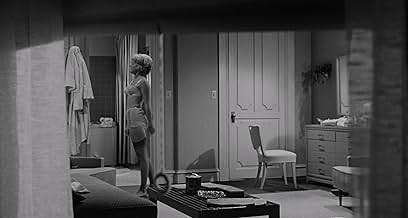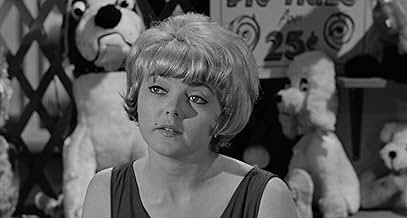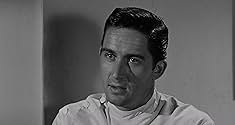IMDb RATING
6.6/10
1.3K
YOUR RATING
An overweight lab technician with low self esteem, brought on by his dominant mother, becomes a serial killer of female nurses.An overweight lab technician with low self esteem, brought on by his dominant mother, becomes a serial killer of female nurses.An overweight lab technician with low self esteem, brought on by his dominant mother, becomes a serial killer of female nurses.
Michael Ryan
- Detective Mel Posner
- (as Michael M. Ryan)
Fred Aldrich
- Apartment House Manager
- (uncredited)
Benjie Bancroft
- Police Officer
- (uncredited)
- Director
- Writer
- All cast & crew
- Production, box office & more at IMDbPro
Featured reviews
It's a Buono showcase. His restrained portrait of an unattractive, mother-hating serial killer is a grabber. No wonder he loathes his bed-ridden mom. Obviously, she's brow-beaten him his whole life, taking what little self-esteem he ever had. Now, at thirty, he lumbers around like a fat rhino among sleek gazelles, picking off single women one-by-one and leaving cheap arcade dolls in their place. Somehow in his twisted mind, however, she won't stay dead. No matter how many times he kills her, there she is back again in her bed, making whining demands. He's almost a figure of pity as much as loathing, and it's to actor Buono's credit that he manages to create the difficult mix.
I like the cops here, especially Sgt. Clyde (Barron). They come across more like real cops than the usual. At the same time, their interviews with suspect Kroll (Buono) are little gems of thrust and parry. Director Topper films in straightforward fashion, without the sinister lighting that might be expected, but with good judicious use of close-up. This is not a slasher-type movie. In fact, despite the lurid material, the movie comes across more like a dark psychological study than a horror film, thanks mainly to Buono's shrewdly calculated performance and Topper's refusal to play up the violence.
I like the cops here, especially Sgt. Clyde (Barron). They come across more like real cops than the usual. At the same time, their interviews with suspect Kroll (Buono) are little gems of thrust and parry. Director Topper films in straightforward fashion, without the sinister lighting that might be expected, but with good judicious use of close-up. This is not a slasher-type movie. In fact, despite the lurid material, the movie comes across more like a dark psychological study than a horror film, thanks mainly to Buono's shrewdly calculated performance and Topper's refusal to play up the violence.
10mercury4
This movie is actually based on the Boston Strangler. There are many hints to it such as; women setting up bottles in front of their door so they can hear the strangler coming in, the stocking tied around the victim's neck and the fact that most of the women killed were nurses. At the time of the murders, they also believed the Boston Strangler was mother fixated, as Leo Kroll is in the movie. There are many things I like a lot better in this movie than The Boston Strangler with Tony Curtis. I love the plot, the score, and of course, the great acting by Victor Buono. Although it is hard to say whether Buono is better than Tony Curtis. You never really see Curtis strangling in his movie. You barely see Tony Curtis at all in The Boston Strangler. That's probably because no one is absolute certain that Alberto DeSalvo was the Strangler. The interesting thing about this movie is that the real Boston Strangler could've very well been a guy like the one in this movie.
After seeing this movie and a couple other movies of Buono, I think he is a great actor. The black and white cinematography is also very good. One thing that definitely sets the mood is the eerie music while Buono is hiding from his victims in the dark. There's even an incredible point of view shot through the Strangler's eye in the beginning. One thing that is very realistic is the fact that Buono gets pleasure while he is strangling, like a real serial killer. Buono also got me to sympathize with him in the movie. Even up until the very end. One of my favorite parts in the movie is when there is a sudden burst of violence when Buono strangles his mother's nurse. Especially great acting by Buono in that scene. At first I thought this would just be another B movie, but it wasn't. It was very well made. See this movie. You won't be disappointed.
After seeing this movie and a couple other movies of Buono, I think he is a great actor. The black and white cinematography is also very good. One thing that definitely sets the mood is the eerie music while Buono is hiding from his victims in the dark. There's even an incredible point of view shot through the Strangler's eye in the beginning. One thing that is very realistic is the fact that Buono gets pleasure while he is strangling, like a real serial killer. Buono also got me to sympathize with him in the movie. Even up until the very end. One of my favorite parts in the movie is when there is a sudden burst of violence when Buono strangles his mother's nurse. Especially great acting by Buono in that scene. At first I thought this would just be another B movie, but it wasn't. It was very well made. See this movie. You won't be disappointed.
... even though the who of this crime drama is always known. It's the what - as in what will he do next? - that kept me engaged.
Allied Artists, under the direction of Walter Mirisch in the 50s, had tried to put out some quality productions. But at the end of the 50s Allied decided it wanted to go back to cheap schlock, with the budget sci fi film cycle being in full swing at the time. This is a rare example of a film after Mirisch's departure that showed quite a bit of quality.
An overweight 30ish lab technician, Leo Kroll (Victor Buono), has been going about strangling women who are strangers to him, other than maybe seeing them in the hall at the hospital he works at or some other place out and about. Leo always uses a stocking to kill the women, always positions their bodies like they are being laid out for a funeral, always closes their eyes. Then he goes home and undresses a doll that corresponds to the latest victim and puts that doll in a desk drawer. He gets some sexual charge out of this activity. Enough is shown about Leo's life that you know he has no friends, no girlfriend, and lives alone except for his mother who has spent her life belittling him and emotionally strangling him.
The police are hitting dead ends in this case that is becoming higher and higher in profile. They have no leads because there is nothing linking the victims to one another or to one particular person. In 1964, such motiveless crimes are still uncommon. And then Leo makes a mistake. He strangles a victim where his motive is personal, and thus the crime scene looks like none of the others. He doesn't know the victim, but now the police have reason to suspect him and note that he told a lie - albeit a minor one - in a past interview where he was one of many interviewed about one of the victims. Complications ensue.
This was a really good performance by Buono, and for that matter, the rest of the largely no name cast. Ellen Corby was good as the mother who drove Leo to insanity with her pettiness, nagging, and criticism. It's a rare instance of her not being the pleasant older lady. Buono was in many ways like Steve Buscemi. Both were rather "funny looking guys" to quote Fargo, yet they excelled at their craft. Given how look-centric Hollywood is though, I have to wonder why they thought they'd have a shot in this profession.
Allied Artists, under the direction of Walter Mirisch in the 50s, had tried to put out some quality productions. But at the end of the 50s Allied decided it wanted to go back to cheap schlock, with the budget sci fi film cycle being in full swing at the time. This is a rare example of a film after Mirisch's departure that showed quite a bit of quality.
An overweight 30ish lab technician, Leo Kroll (Victor Buono), has been going about strangling women who are strangers to him, other than maybe seeing them in the hall at the hospital he works at or some other place out and about. Leo always uses a stocking to kill the women, always positions their bodies like they are being laid out for a funeral, always closes their eyes. Then he goes home and undresses a doll that corresponds to the latest victim and puts that doll in a desk drawer. He gets some sexual charge out of this activity. Enough is shown about Leo's life that you know he has no friends, no girlfriend, and lives alone except for his mother who has spent her life belittling him and emotionally strangling him.
The police are hitting dead ends in this case that is becoming higher and higher in profile. They have no leads because there is nothing linking the victims to one another or to one particular person. In 1964, such motiveless crimes are still uncommon. And then Leo makes a mistake. He strangles a victim where his motive is personal, and thus the crime scene looks like none of the others. He doesn't know the victim, but now the police have reason to suspect him and note that he told a lie - albeit a minor one - in a past interview where he was one of many interviewed about one of the victims. Complications ensue.
This was a really good performance by Buono, and for that matter, the rest of the largely no name cast. Ellen Corby was good as the mother who drove Leo to insanity with her pettiness, nagging, and criticism. It's a rare instance of her not being the pleasant older lady. Buono was in many ways like Steve Buscemi. Both were rather "funny looking guys" to quote Fargo, yet they excelled at their craft. Given how look-centric Hollywood is though, I have to wonder why they thought they'd have a shot in this profession.
This film opens with a written message, announcing that the creators wish to express their gratitude to several police departments and psychiatrists for giving them access to their files and offering assistance with their research. If it weren't for them, the profile of the titular serial killer would never have been this disturbingly realistic and convincing. Now, attention-grabbing gimmicks at the beginning of a horror movie like this can either mean two things. Either it's sincere and the producers had something genuinely ambitious in mind, or it's just a cheap and sleazy trick to mislead unwarily viewers. You know, like falsely claiming a movie is based on true events. Initially I assumed it would be option number two in the case of "The Strangler". Lead star Victor Buono previously already played an obese guy with a strangely eerie mother-fixation, so it would be the ideal occasion to further exploit the success of that classic by revolving an entirely separate film on this concept. Moreover, "The Strangler" came out almost immediately after the apprehension of Alberto DeSalvo – the real life Boston Strangler – and it is prototypical for a low-budgeted exploitation movie to quickly cash in on media hypes. Four years later, director Richard Fleischer presented his version of the factual murder case, starring Henry Fonda and Tony Curtis as the infamous Alberto DeSalvo, and that particular film, and the success of that much more commonly known and widely acclaimed film is presumably the reason why "The Strangler" is a relatively obscure and hidden gem. But let me assure you there honestly isn't the slightest reason to feel skeptical or wary towards this movie. "The Strangler" is a chilling and atmospheric effort, with obvious echoes to Hitchcock's "Psycho" naturally, but also more than enough qualitative aspects of its own. It's rather brutal in tone and execution, with some extremely grim and unsettling moments (especially considering the time of release) and the vivid performance of Victor Buono is undeniably the movie's main trump. Buono depicts the naturally perverted and heavily overweight hospital lab researcher Leo Kroll. Despite of his arrogant wittiness and obvious intellect, Kroll's bed-ridden mother still dominates his life and she uses every opportunity to reassure her son that he's fat and ugly and that no woman will ever love him. Maybe that's the reason why Leo Kroll is a misogynist serial killer who already strangled eight women; all of them nurses. His trademarks are to use stockings and leave broken play dolls at the scene of the crime. The stalk-and-strangle sequences are extremely suspenseful and many of the undertones and sexual insinuations are quite controversial and ahead of their time. Buono's performance is courageous, powerful, stellar and pretty freaking convincing! Buono is authentically sinister, especially when he behaves calm and sophisticated. Great suspense flick, highly recommended!
Was very intrigued by the story for 'The Strangler', being a fan of murder/mystery/psychological films this was the sort of story that would have appealed to me straightaway, and have liked Victor Buono in other things. The racy content that 'The Strangler' has been referred to as having was another interest point.
'The Strangler' turned out to be a nicely done, entertaining and intriguing film that does much more right than it does wrong. Not great or a masterpiece but well above average and worth a watch, would say too that it deserves more attention than it gets. It is very rarely seen now and it deserves better than that.
It does lack finesse visually, with it looking like it was made hastily. Occasionally the pace creaks in spots.
Other than Victor Buono and Ellen Corby, the rest of the cast don't really stand out, not because they're awful but their characters are nowhere near as interesting. Would have liked a slightly clearer motivation for what drove Kroll to target nurses perhaps and why he chose the methods.
Buono however is the main reason to see 'The Strangler'. He clearly has a ball here and while he is often chilling Buono succeeds in making Kroll more than that and gives him a sympathetic edge. Corby is suitably beastly as the dominating mother figure. The direction is more than capable and much of the script is taut and thought-provoking. The music is haunting without being intrusive.
From start to finish, the story is compelling with lots of suspense, especially in the build ups to the killings, and it is hard to not admire the film's raciness in its unconventionally (at the time) brutal tone, that provides some genuine unsettlement, and the ahead of its time content. The pace is mostly both controlled and tight and the investigative/procedural approaches are fascinating.
On the whole, well done. 7/10 Bethany Cox
'The Strangler' turned out to be a nicely done, entertaining and intriguing film that does much more right than it does wrong. Not great or a masterpiece but well above average and worth a watch, would say too that it deserves more attention than it gets. It is very rarely seen now and it deserves better than that.
It does lack finesse visually, with it looking like it was made hastily. Occasionally the pace creaks in spots.
Other than Victor Buono and Ellen Corby, the rest of the cast don't really stand out, not because they're awful but their characters are nowhere near as interesting. Would have liked a slightly clearer motivation for what drove Kroll to target nurses perhaps and why he chose the methods.
Buono however is the main reason to see 'The Strangler'. He clearly has a ball here and while he is often chilling Buono succeeds in making Kroll more than that and gives him a sympathetic edge. Corby is suitably beastly as the dominating mother figure. The direction is more than capable and much of the script is taut and thought-provoking. The music is haunting without being intrusive.
From start to finish, the story is compelling with lots of suspense, especially in the build ups to the killings, and it is hard to not admire the film's raciness in its unconventionally (at the time) brutal tone, that provides some genuine unsettlement, and the ahead of its time content. The pace is mostly both controlled and tight and the investigative/procedural approaches are fascinating.
On the whole, well done. 7/10 Bethany Cox
Did you know
- TriviaAccording to director Burt Topper, Victor Buono puffed smoke into his eyes to create tears for a particular scene.
- GoofsWhen the police are on the way to the first murder, they are driving in a 1950s boxy sedan. However, when the police arrive, they are in an early-1960s sedan.
- Crazy creditsDavey Davison's "Introducing" billing is correct as far as feature films go, but she had appeared on several TV series prior to this.
- ConnectionsFeatured in Late Movie 18: The Strangler (1979)
- How long is The Strangler?Powered by Alexa
Details
- Release date
- Country of origin
- Language
- Also known as
- El estrangulador de mujeres
- Filming locations
- Production company
- See more company credits at IMDbPro
- Runtime1 hour 29 minutes
- Color
- Aspect ratio
- 1.85 : 1
Contribute to this page
Suggest an edit or add missing content



















